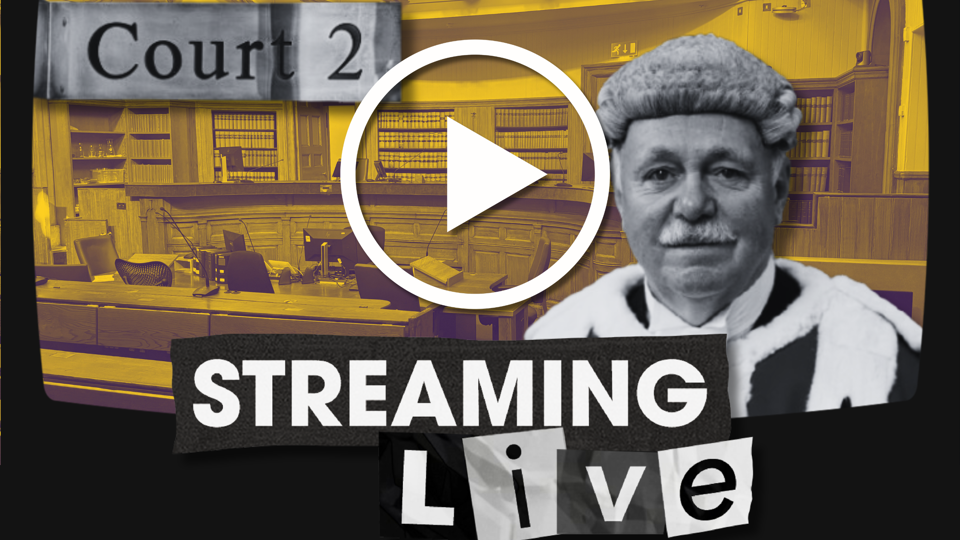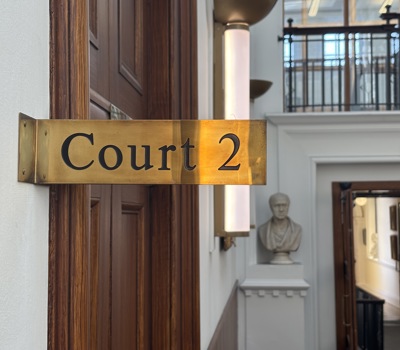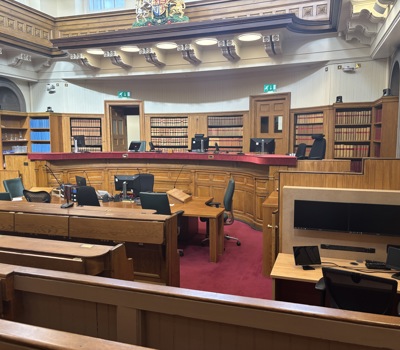Why Scotland's criminal appeal court going live is a big deal for justice

The Criminal Appeal Court is to become the first criminal court in Scotland with a regular livestreaming service, allowing hearings to be viewed online by the public.
Beginning on Friday, August 29, solemn criminal appeals will be broadcast live in a bid to improve access, openness and transparency in the appeal court.
The launch of Criminal Appeal Court Live is part of the Judiciary and Scottish Courts and Tribunals Service's commitment to open justice and follows a similar successful project in the Court of Session, dating back to 2023.
The scheme will initially focus on appeals against conviction and Crown appeals against sentence, but eventually the aim is for all appeals to be broadcast.
The Lord Justice General, Lord Pentland, said: “The principle of open justice is fundamental to our legal system and, indeed, the stability of our country. It helps secure the efficient and impartial administration of justice and supports public confidence in and respect for the rule of law.
“The launch of Criminal Appeal Court Live is the latest initiative to be introduced as part of our commitment to this important principle and I’m pleased to open up the court to a much wider, online audience.
The service will help to educate and inform the public about the work of the Criminal Appeal Court and allow interested parties – including complainers – to view proceedings without the need to attend in person.
“It will also provide the media with more efficient access to cases to assist with informed and accurate reporting and allow academics and students to engage with the court process in a more convenient way.
“This is an important step in ensuring that justice can be seen to be done in today’s digitally driven world.”
How will Criminal Appeal Court Live work?
Court 2 at Parliament House in Edinburgh has been fitted out with new livestreaming equipment to be controlled by a camera operator. They will be able to ensure ‘high standards of audio and visual output’, said a SCTS spokesperson.
Details of the service and upcoming cases, including details of the appeals, links to the livestream feed and any written decisions of the court will be listed on the SCTS site.
Where appropriate, the hearings – which feature arguments from the prosecutor and defence advocates – will also be available ‘on demand’ allowing viewers to watch the proceedings at a time convenient to them.
Malcolm Graham, SCTS Chief Executive, said: “The launch of Criminal Appeal Court Live is another significant development for SCTS which will support open justice and transparency in our courts.
“The new service will allow greater public understanding of appeal cases and provide a means for complainers and other court users to view proceedings without the need to attend court – either live as it happens or at a later stage.
“This is a strong example of how technology can improve access for those who use or have an interest in our courts, and I am very thankful to everyone involved in this initiative for their hard work in developing it.”
Lord Clark, who leads the livestreaming project, added: “This is a significant progression in our livestreaming journey and marks an important milestone for Scotland’s courts.
“The launch of Criminal Appeal Court Live builds on the success of the Court of Session livestream which has streamed 68 hearings since it was launched, with cases of significant public importance reaching viewing figures of more than 5,000 at times.
“I’m confident that the move into criminal appeals will also attract a high level of interest and bring additional benefits to those who use our courts.”
Analysis
Joshua King
The aphorism ‘justice must be seen to be done’ now dates back more than 100 years, penned by Lord Hewart in his judgement in R v Sussex Justices ex parte McCarthy. It’s evolved since then to encompass the whole concept of open and transparent justice.
It’s also the rationale behind this latest move by the SCTS to livestream criminal appeals. Of course, most cases are public already, anyone can attend in person in Edinburgh unless a judicial decision to limit access (to protect a vulnerable witness, for instance) is taken.
And, writing as a journalist and former court reporter, I understand the crucial role the media plays a part in Lord Hewart’s maxim – clearly not all Scots could fit inside Court 2 at Parliament House to witness criminal appeals, so the press act as representatives, to witness proceedings on the public’s behalf, report them and help uphold the proper administration of justice.
Criminal Appeal Court Live is, therefore, an incremental step. Evolution, not legal revolution. Civil appeal court livestreams have been operating in Scotland for two years, and Lord Clark has revealed sometimes thousands of people are watching civil appeals at any given time. Clearly there is an appetite.
What’s more, Scottish courts have allowed filming of criminal sentencing for same-day broadcast for some time now, and some documentary makers have been allowed inside courts for filming.
Nevertheless, this is a profound moment as well as an incremental step. All these other instances of public access to criminal proceedings, barring actually being in the courtroom in person, are filtered through an expert lens with the perspective of a journalist, filmmaker or judge guiding and giving commentary. Watching live, from home, without concurrent commentary, does give the public a truly transparent view of the judicial process. But it is also open to abuse.
In the era of social media-driven politics, AI and deepfakes, bad actors can and do push agendas with edited or fabricated content online. Livestreamed court footage available to all will likely be a target. Such behaviour could carry criminal penalties, and we shouldn’t allow the potential of abuse to limit the actual transparency of the court process.
As Edith Forrest KC said, speaking to Gordon Cree on STV: “It’s a positive move, it gives transparency to the criminal procedure, it gives people who wouldn’t normally attend the court a [chance] to view it and it gives an opportunity for a greater understanding of the criminal justice system.”
We have heard it is unlikely evidence from witnesses will ever be broadcast, but it is understood the courts are already considering which other elements of trials could be streamed.
How have Scotland’s legal bodies reacted?
Stuart Munro, Convener of the Law Society of Scotland's Criminal Law Committee, said: "In principle we support this move, which will give the public a clearer idea of how the courts deal with criminal appeals. It’s important that our criminal justice system is open, transparent and accessible. This development comes on the heels of similar moves in the Supreme Court and Court of Session.
"There are limits on the potential use of livestreaming in criminal cases, and we don’t see any prospect of the technology being extended to criminal trials. Aside from the possible deterrent effect on people coming forward to report crime or offer witness testimony, there’s also a risk that broadcast material could be abused, something that is very difficult to police. These concerns don’t arise, at least to the same extent, in the context of appeals."
Ian Duguid KC, President of the Faculty of Advocates Criminal Bar Association, said: “The Faculty of Advocates Criminal Bar Association welcomes the extension of livestreaming of court proceedings into the Criminal Appeal Court. In the most recent past, there have been recordings of court proceedings in High Court murder trials with their subsequent screening in television documentaries.
“These programmes have been well-received by the public, according to the broadcasters and film production companies. It is clear that the Court values an open and transparent justice system and rightly so. If this advance enables the justice system to be more relatable to members of the public, then it deserves the full backing of the participating lawyers, even if practices might require slight modifications to protect the identities of some interested parties.”
A spokesperson for Scottish Sentencing Council said, “The livestreaming of the Criminal Appeal Court is a welcome step which will assist with improving understanding and awareness of sentencing in Scotland, one of the Scottish Sentencing Council’s key objectives. The Council will be pleased to consider opportunities to build this positive development into its public education programme.”
---
Details of cases to be livestreamed can be found on the Criminal Appeal Court Live webpage on the SCTS website.
The first case to be livestreamed under the new service is planned to take place on 29 August. This is an appeal against a decision to grant an extension of time limits in a case.










